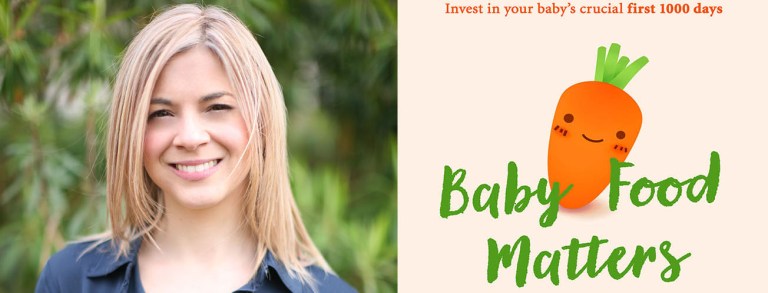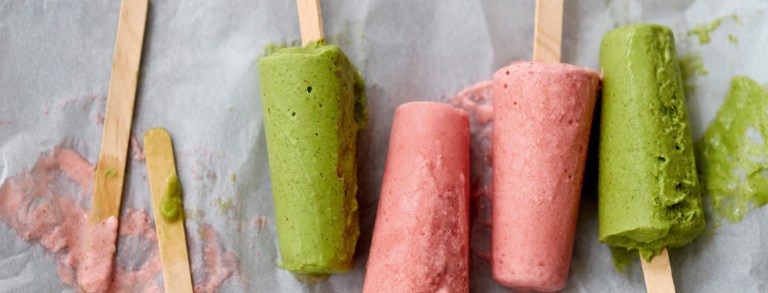7 Things I Learned Weaning A Baby

Introducing your baby to food is a fun, messy, exciting part of being a parent. Its also strange – your tiny dependent creature who has been doing well on his or her magical liquid diet is suddenly allowed to eat some of the same things as you do. But as with anything baby-related there are different philosophies and approaches, and everyone has an opinion. Here are some of the weird and wonderful discoveries I made when my own son moved on to solids.
Baby led weaning (BLW) is a lovely idea, but a mixed approach has it’s perks
For the uninitiated, BLW means offering your baby various foods in their original form (i.e. non-pureed), and letting them control how much they eat. Spooning food into your kid’s mouth is discouraged, as is blitzing everything with a blender. In BLW, you just give baby the very things you might eat*, and indeed sit and eat your meal alongside them.
In theory the BLW-baby is exposed to many textures and flavours, and unlike her puree-guzzling peers, he or she learns to handle something thicker than a smoothie without choking on it. Soon enough BLW-babies are eating a full roast dinner next to you in the pub, using a knife and fork and asking you to pass the horseradish, while their nursery-buddies are still slurping directly from a pouch of Ella’s Kitchen.
The thing is, while some six-month olds are keen to very gradually learn to chomp carrot sticks and entire apples while they continue to fill up on milk, my own baby was ravenous for solid food and would screech in frustration. His enthusiasm was far greater than his hand-eye coordination, and sometimes it made for a happier home to just shovel something into his mouth. So in the end I admit I mashed things up that I myself would never eat mashed, and I helped him with his spoon. I’m not convinced it slowed him down – pretty quickly he was stealing my fork and feeding himself with it, despite my failure to be purely baby-led.
Eating solids doesn’t suddenly make them sleep better
This is just a lie perpetuated by grannies who want to take your child into a sweetshop and get them addicted to sherbet dib dabs in the name of filling them up (see ‘Grannies are obsessed with sugar’ below). The main two reasons it doesn’t work is…
- They don’t immediately drop milk feeds.Some babies will take leisurely steps towards eating three-plus meals a day, and some may race there, but either way for at least a few months after starting solids they’re still going to want plenty of milk in their diet. Initially a lot of the food babies will start on (i.e. vegetables, whether as finger-food or puree) contains very few calories and won’t be enough to replace milk.
- There’s a period of tummy adjustment. Well, imagine you had gone six months consuming only protein shakes, and were suddenly offered a hamburger. A little discomfort is inevitable when new foods are introduced. It passes, but expect a few squirming tummies reminiscent of those burpy newborn days. (Of course anything more than discomfort, such as a rash or severe pain, could indicate a food allergy – common ones include allergies to peanuts, eggs and dairy – and is worth seeing your doctor about).
Grandparents are obsessed with sugar
As a first child myself, I was subject to all of my mother’s highest parenting ideals, and rarely allowed sugar until I was around fifteen. I wasn’t even allowed fruit juice with a meal! But my son, at 12 months, was – according to my mother – deprived, because I refused to offer him a slice of chocolate cake.
Sugar isn’t the end of the world
In a sense, though, my son’s grandparents are only acting to restore the natural balance of the universe. Children will encounter sugar eventually, and the best approach is probably not to demonise it, inadvertently making it an alluring mystery. My son’s nursery report came back one day reading ‘Jonny enjoyed his ice cream and cake today’. So, they’d been filling him with sugar all along? I’d been oblivious. Nowadays we offer him age-appropriate portions of whatever we’re eating. It’s usually healthy, savoury food, but sometimes it’s cake and ice cream.
Nappies
Solids change the game, and not in a good way. The less said about it the better.
‘Fussiness’ is not your fault (but it can help to ignore it)
Babies love to change the rules. My own son was very devoted to sweet potato for months, but suddenly wouldn’t touch it one day. He did the same with a lot of food, especially after around 10 months. At one point I found myself making him the same plain rice meal three or four times a week because I knew he would eat it, then tearing my hair out when suddenly he wouldn’t even touch that.
I read two wonderful pieces of advice while trying to address his fussiness. One was that children often need to be exposed to a food up to fifteen times before they’ll eat it. Your child turning down a mushroom does not mean you should never put a mushroom on the table again – in fact this is likely to compound their aversion. The other was that it was acceptable to leave the job of eating to the child. I just had to provide the food. I stopped catering only to my baby’s narrow tastes, cajoling him to eat, and offering rewards and punishments for eating ‘well’, all of which turn food into a battleground. No parent wants to see their child ravenous and grumpy, but as long as you’re providing them with plenty of healthy food at regular intervals, the baby will, most likely, find something on their plate they can stomach.
Finally, there’s no single way to do anything baby-related
The world loves to give parents a rulebook (ideally one that contradicts the previous rulebook) when it comes to every aspect of parenting. Sleep, potty-training, how to praise (or how not to). Weaning is no exception. Fortunately babies have an in-built bullshit-detector and will chew holes in said rulebook and teach you what is going to work for them. And something will work, in the end – just do what keeps you sane.
So, while moving on to solids, remember that your child will eventually accept broccoli into their life, master table manners, and might even cook dinner for you one day. Marvel at their amazing potential, and try to enjoy the mess, noise and chaos of early mealtimes while they last.










